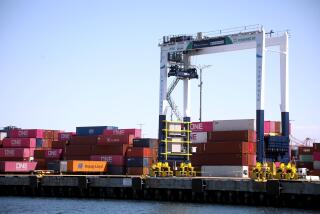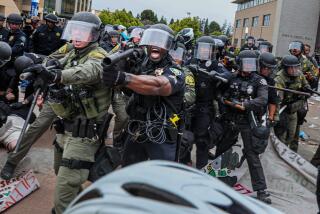A convenient truth: UCI students may save us all
- Share via
Lot of green talk at the Oscars the other night. Former Vice President Al Gore won an Oscar (sort of) for “An Inconvenient Truth,” the documentary film on global warming that he narrates. Then, singer-songwriter Melissa Etheridge won an Oscar for her song that accompanied the film.
During the show, Gore made an oblique reference (at least, I didn’t get it) to the Academy Awards organizers for making the production environmentally friendly. And to a worldwide audience, Gore was hailed by Etheridge and best actor nominee Leonardo DiCaprio for his stellar efforts.
But that was Hollywood.
What’s going on in the real world, which for my purposes I’ll define as UC Irvine? Is anybody doing anything to save us from environmental doom?
I’m happy to report that the answer appears to be yes.
In what qualifies as a cool coincidence, UCI’s National Fuel Cell Research Center is unveiling a hydrogen-fueling station today at the corner of Campus Drive and Jamboree Road. It’s not a public event, but researchers hope stations like it someday will be as common as your corner Mobil or Arco and help power a new millennium of vehicles.
But the center, which has been around since 1992 and formally established on campus in 1997, doesn’t focus primarily on vehicles. Rather, its researchers are looking at a range of fuel-cell technologies that -- to laymen like me -- still involve phraseology that often is a very large mouthful.
Therein lies part of the challenge: it’s also laymen like me -- and maybe you, too -- that this generation of researchers and industry will need to reach to improve the environment.
Can it be done? “I can answer that unequivocally with a yes,” says Jack Brouwer, the center’s associate director. He says that with a laugh, but that doesn’t mean he isn’t serious. What he means is that alternate energy sources and the other environmental advances will work but that private industry won’t embrace them until the public does.
Brouwer touts a program in which some 200 people are sharing 40 battery-powered, zero-emission vehicles to get around, mostly in Orange County.
The participants love it, but, so far, no major auto manufacturer plans to build them en masse.
So, the struggle continues. The center is working, primarily with Toyota, on hybrid fuel-cell technologies (I told you everything is a mouthful). While the car-driving public thrives on gas-guzzlers, the center continues laying the groundwork for the day when alternative power sources -- like hydrogen -- might be more in vogue.
Is it exciting or frustrating to be researching concepts that are far ahead of the public appetite? “A bit of both,” Brouwer says. “However, I’m quite excited about the future and primarily because of our excellent -- I would say most excellent -- applications and student interest. The fact is it’s very interesting to students, and the best qualified students are applying to our program. I’m talking best in the world.”
The center, part of the Henry Samueli School of Engineering complex at UCI, has about 35 students and 20 faculty members.
They are part of a Southern California web of private and public operations that work in the perfect laboratory -- the rather dirty Los Angeles Basin. And in a nice irony, while the area is internationally recognized for its environmental efforts, “we still have very bad environmental problems today,” Brouwer says.
The good news, he says, is that technologies already tested at the UCI center convince him that subsequent generations that use them will not lose either the freedom of mobility or the quality of life that we now have.
That’s what Gore and DiCaprio and Etheridge were trying to say at the Oscars.
Whether any of them lives to see a proliferation of hydrogen fueling stations, well ....
On a night when Martin Scorsese won a long-overdue Oscar, maybe anything is possible.


